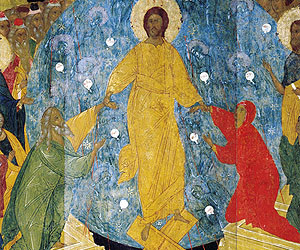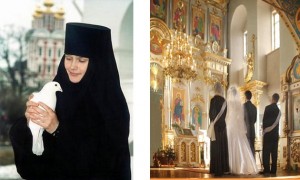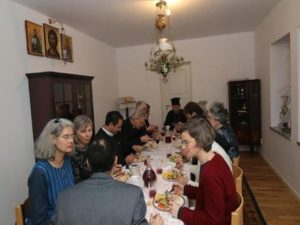Person and Family
24 October 2012Family is a very ancient bio-social institution which goes back as far as human history itself. It made its appearance immediately after the creation of the first people and has, since then, accompanied us, without substantial changes, through all the stages of our cultural development.
We might call the family the most basic and ancient social unit, because from it sprang almost all the modern, structured, social ties, which were shaped in accordance with its model. Despite its apparent collectivity, the family is not an impersonal group, but, mainly, a heterosexual unit of persons which, through procreation, gives to its members their actual kinship. In other words, a family cannot be other than a couple with at least one child.
The couple has the opportunity to develop into a mutual transcendence of individuality and into a reciprocal manifestation of love, which has as its fruit the birth of a child. Because only a child can become the undisputed link between the spouses, since it binds in parenthood people who are not themselves kin by blood. In other words, behind the family we have to see the experience of paternity and maternity, which come as inexplicable psycho-spiritual relationships with the child after its birth.
Given all this, the family is, at bottom, something more than a social symbol or a biological consequence. It is something more than an institution. It is principally a curious encounter between people who create a communion of love in their personal self-emptying. It is, essentially a locus of repeated sacrifices, which are built on the eradication of individualism and which are expressed as maternal affection, paternal interest and responsibility, as conjugal reciprocity, as filial gentleness, dependence and worship. This is also the reason why, from antiquity, the family has been an object of interest to religions.
In Christianity, in particular, marriage was considered a mystery from the beginning. A truly great mystery, which is hallowed by the grace of the Holy Spirit, because, according to Saint Paul, it is conducted in the name of Christ and to the glory of the Church. This projection of marriage within the ecclesiological dimension reveals its importance as the foundation of the Christian family. In this way, the family becomes the lych gate to the Church because it is the place where love, unity and reciprocity are experienced.
It was impossible for such a dynamic, which has the ability to transform people, not to be extolled. Even from the very earliest Christian centuries, the Fathers of the Church placed great emphasis on the importance of the family environment and highlighted its significance for the formation of powerful personalities.
In order to understand the above truth, we have to see the family as a locus where the spouses can meet spiritually. It is only in such a dimension that unity is possible, as well as constructive dialogue. Without unity, co-habitation is impossible and without creative dialogue conjugality is unthinkable. For both to exist, there has to be cordiality, understanding is required, love is a necessity, patience is a sine qua non, as is a willingness to make concessions. All of these express spirituality.
So spirituality is necessary to promote the elements of virtue belonging to two dissimilar personalities and to set aside egotism, stubbornness, pettiness, self-interest, self-indulgence and weaknesses in general. Because we should not forget that spouses are not siblings, they are two strangers, two different worlds, two specific personalities, two inflexible people from separate environments with different upbringings and psychological constitutions. And yet, these two personalities, within the context of marriage, are linked in an astonishing spiritual unity and offer whatever is best between them. This is the first miracle associated with the mystery of marriage. Of marriage which becomes a locus of development for social virtues which had until then been unknown in the two separate personages. And when that sweet little angel comes to be enthroned between the two of them, then an even more profound spiritual change occurs. Then the second miracle is realized, which is linked to procreation and is the first-fruit and beginning of the real family.
So the family is the locus within which the grace of God performs the miracle of union between two people who had been strangers just before, and the miracle of creation. But these miracles are blossoms of divine love, which, in order to flower, needs suitable soil, the right conditions and requirements, which only spirituality and the virtues can create. So for marriage to become a mystical communion and for procreation to be real creation, the members of the family need to deposit in the common bank of unity only their virtues, spiritual values and qualities. Without this, marriage always becomes a punishment and the family a place of conflict, animosity and hatred.
This last, dramatic reality can hardly be doubted in our own times. Because, obviously, the modern crisis of values and morals has affected the family and its cohesion. Indeed, there are many who have reached the conclusion that the general crisis actually derives from a breakdown or weakening of the structure of the modern family.
This is not the place or time to analyze the origin of the spiritual crisis in today’s society, but we cannot ignore or refuse to speak about the fact that the above phenomena are mutually linked. Because even if there are some exceptions, events prove the rule. And the rule demonstrates every day, with irrefutable statistical data, that couples who build the success of their families on emotionalism or self-interest, on egotism and high-handedness, on stubbornness or absurd demands, on notions of rights or manipulation and freedom, are brought, with mathematical precision, to divorce. Phrases such as “irreconcilable differences” or “by common consent” or some such are legal measures aimed at curtailing family dramas. But what the details concealed behind these phrases are, few can know. Usually, after the decision of the court, the curtain falls, to bring to an final end the family tragedy, but also, often enough, to signal the start of new dramas, the victims of which will henceforth be the offspring of the divorced couple, the children of the brainless parents.
Innocent little creatures, who, with the break-up of the family lose their inner equilibrium. Real little angels, who, however much they do not reveal it, live through, in their own way, an unbearable pain, a mute torture. Victims through no fault of their own who are stamped from the cradle with the mark of desertion, loneliness and pain. And the parents, the former parents? Well, they are free as birds. Indeed, each of them hurry to find a new partner and make a new life. And when everything is going well- “Let’s tell the child as well so it can start getting used to it”.
“You know, from now on X is going to be your new daddy”, or, conversely, “Y’s going to be your new mummy”. Nice trick. Very civilized and the aftermath is very tempting, because then the presents start: the presents, the dolls, the train sets, the outings and the sweets. “It’s a kid”, they tell you. “It’ll get used to it”.
What naivety, and also what ignorance to believe that depriving a child of its mother or father can be compensated for with material things, or with feigned love on the part of a stranger, as if paternity and maternity were acting abilities. Of course, there are, indeed, moving instances in which the new parents demonstrate boundless love and affection for children who are not their own and who offer them greater support than their biological parents. But this compensation can never diminish the responsibility of the birth parents who have blown their family apart through madness, stubbornness, egotism, passion or “excitement”.
Parents often do not reach a separation. They continue to live under the same roof, act like a real couple, but any communication between them has long since turned into unceasing conflict. They have forgotten the meaning of love, patience, tolerance, forgiveness, support and responsibility for their children and, at the least provocation the house is turned into a battleground and a pit of violence. It may be that one is to blame, or both, but in each case, the outcome is the same: shattered harmony, loss of calm and the collapse of the true purpose of the family. These are dangerous factors in the upbringing of children, who, even if they do not speak or protest still feel the destructive effects on their souls and their characters.
Or again, a fatal passion or vicious habit can distract parents from their responsibilities and duties to the family and the consequences are often not long delayed as regards both shaking their own foundations and also profoundly affecting the other members of the family. Inebriation, gambling, laziness, speculation, a “cool” life-style, inconsiderate manipulation of others and unreasoning attachment to secular things do not have merely personal consequences, but threaten and erode the whole of family life. So the family is gradually transformed into a source of pain, a crumbling ruin. So much heedlessness, so much irresponsibility, so much immaturity, so much ignorance about the greatest mystery of life. Cheap thoughts, cheaper impulses and even cheaper content, and we expect to change the world, and the family to become a communion of love, a union of persons, a paradise of angels on earth, a foundry where character is forged, a portal to the Church, an altar and temple of God. A deplorable error, an unattainable utopia.
The family is like the most precious diamond for people, the acquisition and preservation of which demand sacrifices and capabilities, patience and persistence. It is not an easy task to find a diamond, because then everyone would do so and it would lose its value. It is, perhaps, incalculably more difficult to create a blessed family, and equally so to maintain it, because for that you need not only abilities but, particularly, virtues, with love foremost among them. Love, however, that will forgive, forbear, endure, sacrifice and also restrain, guide, administer, advise and cultivate additional responsibility in all the members.
In such an atmosphere, the reciprocal relationships between the members are incorporated into a hierarchical harmony, where privileges and obligations, rights and duties are balanced and dependent on the general good. Love transmutes obedience and makes it not a slavish conformation to imperious authority but a noble induction into an interpersonal unit, which is necessary in any blessed family.
From the factors above, we have seen that marriage and the family is not an easy decision or a frivolous enterprise. It is, mainly, mystery and creation: the mystery which sanctifies the love of the persons and the creation which copies God and transforms this love in human beings. What is required for such a magnificent miracle to be made manifest, for the couple to attract the grace of God and found a genuine family, is spiritual quality and for the spouses to be persons. For them to be hearts with love and humility, with a sense of responsibility and self-sacrifice. For them to be souls with faith in God.
Source: Vasileios T. Yioultsis, «Πνευματικότητα και κοινωνική ζωή» (Spirituality and social life), Pournaras Publications, Thessaloniki, pp. 96-104.












